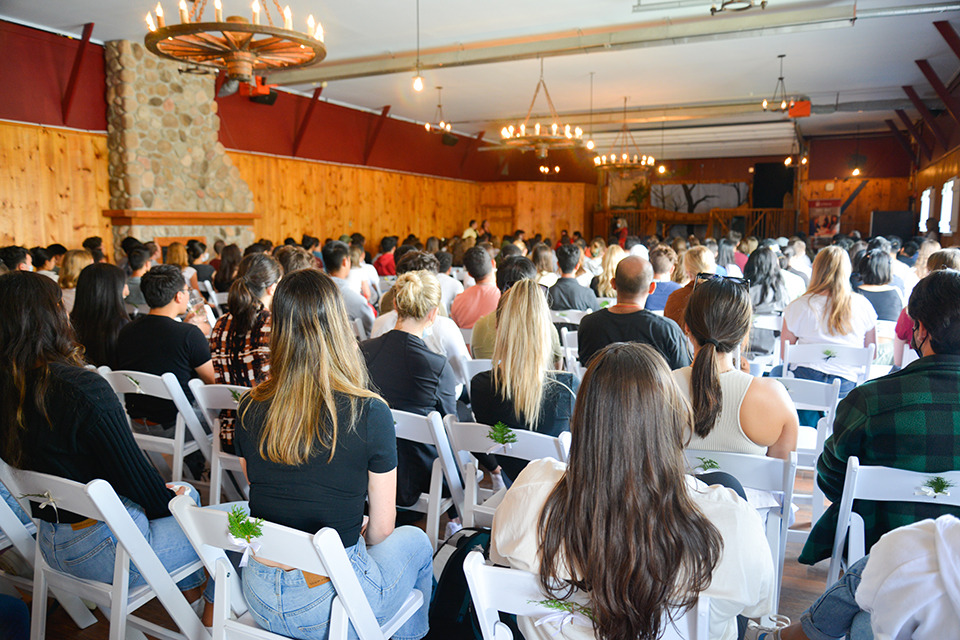For the first time in person since 2019, new MD students from the Faculty of Medicine gathered earlier this month in a celebration of life, health and fellowship.
The Faculty held its Indigenous Celebration on September 7, hosting all 168 first-year medical students as part of a mandatory introduction to Indigenous health. An annual event for first-year MD students since 2005, the day is an opportunity to see, hear and feel First Nations, Inuit and Métis cultures directly.
The Faculty of Medicine and the Indigenous Program support reconciliation by teaching Indigenous health and social issues to students as they begin their medical training, sensitizing them to the role of social accountability in health care.
Socially accountability toward the populations we serve entails the provision of equitable access to health care for Indigenous patients as well as culturally safe care. In learning about Indigenous cultures, health and social issues, medical learners begin their journey toward cultural safety and reconciliation; as they treat patients now and later as physicians, they are encouraged to understand who their patients are and where they are coming from.
As such, the Indigenous Celebration is considered a critical component of uOttawa’s first-year undergraduate medical education (UGME) curriculum.
On the morning of the Celebration, students were transported by bus to Mādahòkì Farm on West Hunt Club Road. The Celebration began with a welcome from Dr. Darlene Kitty, director of the Faculty’s Indigenous Program. Opening prayers followed from Algonquin Elder Claudette Commanda, Inuk Elder Maria Brazeau, and Métis Elder Reta Gordon, who has spent much of her life sharing her culture with the community.

Mādahòkì Farm is “a safe space where Indigenous communities can reconnect with the land through both healing and wellness programs and social enterprise opportunities. It will help to work towards greater understanding and reconciliation with all Canadians through sharing the traditional teachings and gifts of the land from an Indigenous perspective.”
Dr. Kitty, a Cree physician who practices in her home community of Chisasibi, explained to the students that learning and doing more to understand who their Indigenous patients are and where they are coming from, contributes to reconciliation and the Truth and Reconciliation Commission’s Calls to Action #24: teaching professionals to learn about residential schools and Indigenous health curriculum.
“This will help you to achieve and give culturally safe care,” she said. “I would like to wish you all a wonderful day of learning about our Indigenous cultures, the beauty of our music and the strength of our dances. Feel the connection to the land that Indigenous peoples highly value and cherish. These are important elements of our health and well-being, that you should appreciate when you care for Indigenous patients and families.”
Dr. Kitty also presented remarks from Dr. Charles Su, interim vice-dean of undergraduate medical education, who was unable to attend.
“On the beautiful land of Mādahòkì Farm, as we start our journey in medicine, let’s think about the Earth, the people and how we can learn from each other,” Dr. Su said in his remarks. “We are all gathered here to learn to take care of each other; it is our unity in working towards the common goal of serving our patients and population that we are celebrating.”
After further words from Dr. Kitty, special guest speaker Elder Commanda addressed the students. An alumna of the University of Ottawa, Ms. Commanda has dedicated the last 35 years to promoting First Nations people, history, culture and rights in various capacities, and in November 2022, will step into the role of chancellor of the University of Ottawa.
Elder Gordon offered a blessing of the food and guests were treated to a meal featuring Indigenous cuisine, after which attendees enjoyed a cultural showcase by local Indigenous peoples including traditional drummers, singers, dancers and artisans.
The closing Honour song wrapped up the Indigenous Celebration for another year.
Since 2005, our Faculty’s Indigenous Program has worked to develop awareness of Indigenous issues and to support the admissions and training of Indigenous medical students. This important priority of our medical school is in keeping with TRC Calls to Action #23, and also supports our Social Accountability mandate.
“We are proud to say that since 2005, 76 Indigenous students have graduated and moved on to residency and practice, and w also currently have 13 students in pre-clerkship and clerkship in our school,” said Dr. Kitty.
Visit the Indigenous Program’s webpage to learn more.

All photos: Chonglu Huang
Main photo: Elder Claudette Commanda speaks to medical students around the fire at Mādahòkì Farm as part of the Facuty of Medicine's annual Indigenous Celebration.
Consider supporting the University of Ottawa.
The Dr. Arlington F. Dungy Scholarship for students in the Faculty of Medicine's Indigenous Program awards bursaries for Indigenous students in the MD program at the Faculty of Medicine.







